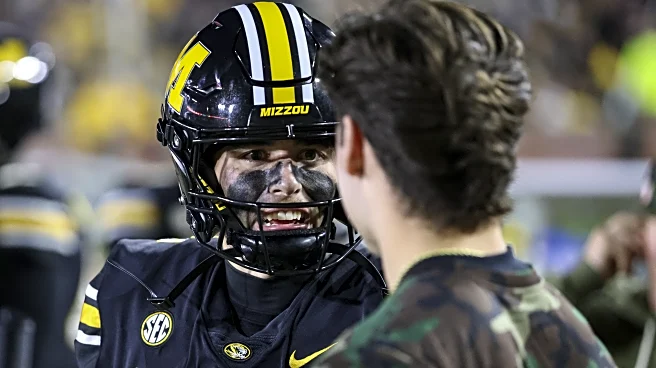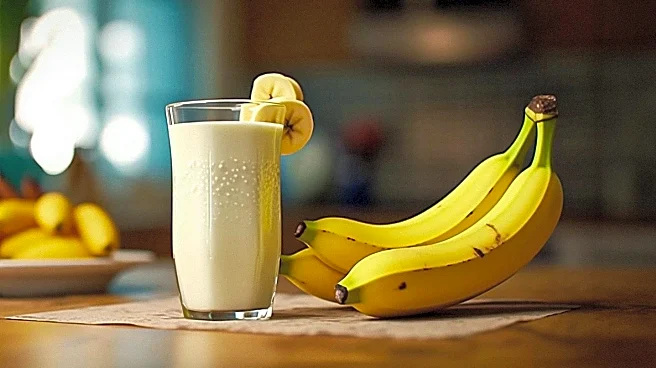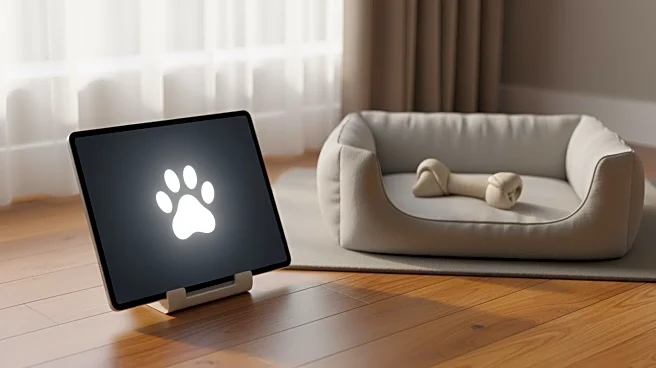When Beau Pribula was carted off the field in Nashville last month, nary a Tiger fan believed he’d suit up again for the Black and Gold in 2025. When it came out later that day that he had dislocated his
ankle (I wince just typing that phrase,) those fears seemed to be just about confirmed.
Fast forward just three short weeks and, either through some miracle of modern medicine, or the fact that Beau Pribula is just built different, early reports are trickling out that he might be able to step back on the field against Oklahoma this week:
Setting aside the fact that it’s crazy to think Pribula is even considering playing just four weeks after dislocating his freaking ankle, it creates an interesting debate over whether Eli Drinkwitz should opt to play Pribula over freshman Matt Zollers even if Pribula is medically cleared. There certainly are pros and cons to either decision. Let’s take a look at which side outweighs the other.
The case for Beau Pribula
If Mizzou is going to enter the lion’s den that is Gaylord Family Stadium (a place where the Tigers haven’t won in nearly 60 years,) and come out with a win, they are going to need the most composed, reliable quarterback play of the season. Pribula’s experience gives the Tiger offense the best chance to function against what may be the best defense in the country in what may be the most hostile environment of the season.
Oklahoma’s front seven thrives on forcing mistakes, and the Sooners turn crowd noise into fuel. Pribula has already navigated a similarly hostile environment and defense in Auburn and come out with a win. He processes faster, communicates cleaner and, most importantly, has shown he won’t let a game avalanche on him. Against a defense that punishes hesitation, that steadiness matters more than arm talent or long-term upside.
Additionally, the passing game has sputtered since Zollers was forced into action. In the first seven and a half games, Pribula completed 70 percent of his throws and averaged 225 passing yards per game, providing rhythm and efficiency. In the last two and a half games, basically since the third quarter in Nashville, Zollers has completed 48% of his passes and just 131 yards per game. The difference in efficiency and efficacy in the passing game is stark. Against a unit as good as Oklahoma’s, Mizzou cannot be one dimensional.
Finally, even while managing an injury, Pribula’s ability to run gives the Tigers a dual-threat dimension Zollers cannot replicate. His movement forces linebackers to hesitate and adds conflict to the perimeter. That matters even more this week: Oklahoma ranks third nationally in rushing yards allowed per game. A static, traditional run game will struggle. A quarterback who can diversify the ground attack gives Mizzou the best chance to loosen Oklahoma’s front and sustain drives.

The case for Zollers
First, even if Pribula is medically cleared to play just four short weeks after (once again) DISLOCATING HIS FREAKING ANKLE, he will not be fully healthy. Asking an already-limited version of Pribula to take on the nastiest, most physical defense Mizzou will face all season is a risky proposition. Oklahoma thrives on collapsing the pocket, hitting quarterbacks and forcing offenses into dreadful situations. A less-than 100% Pribula would be entering that environment at a disadvantage, limiting both his movement and potentially the playbook. If mobility is one of his key strengths, and that tool is compromised, then the Tigers may be better off turning to the quarterback who can play without restriction.
Second, Zollers’ arm talent is undeniable, and this might be the exact match up where that matters most. Oklahoma ranks among the nation’s best in run defense, which suggests the Tigers may struggle to establish the ground game regardless of who plays quarterback. If the Tigers are forced to throw to win, Zollers gives them the highest passing ceiling, even if it has yet to fully materialize on the field. He has the physical ability to challenge tight windows, hit deep shots and stretch a defense that expects to control the line of scrimmage. Consistency and decision-making remain hurdles, but if Zollers finds his rhythm, he can unlock parts of the offense that no other quarterback on the roster can.
Finally, Zollers is the future of the position for the Tigers. Whether that full transition has already occurred, happens next season or not until 2027, Eli Drinkwitz himself has said that Zollers is the long term quarterback for Mizzou. Every snap he takes has the opportunity to accelerate his development. Starting him now, in a hostile road setting against a top-tier defense, could give him invaluable experience and move the program toward its long-term identity. If he is going to be the quarterback Mizzou builds around, then the future might as well start today.

Beau-lieve
In the end, the decision comes down to risk versus stability. Zollers’ upside is obvious, and his arm could eventually transform Missouri’s offense. That said, thrusting a freshman into one of the most hostile environments in college football against perhaps the toughest defense the Tigers will face this season carries real developmental risk. A rough outing in Norman could set him back more than it propels him forward.
Pribula, even if not fully healthy, offers a steadier hand. His accuracy, efficiency and experience in high-pressure settings gives Mizzou a better chance to manage the moment and avoid the early mistakes that Oklahoma’s defense exploits. If the Tigers are going to win in a place they haven’t won in nearly 60 years, they need that level of composure.
As it was at the start of the season, the practical choice is the veteran. If Pribula is healthy enough to play, he gives the Tigers their best chance to win now while allowing Zollers to grow at a pace that protects the future.









